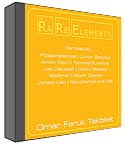 |
 |
 |
 |
 |
 |
 |
 |
 |
 |
 |
 |
 |
 |
 |
|
|
To listen to audio on Rock Paper Scissors you'll need to Get the Flash Player
|
 |
| log in to access downloads |
Sample Track 1:
"Yalel, Tommie Sunshine" from Rare Elements
|
Sample Track 2:
"Shashkin, Cheb i Sabbah" from Rare Elements
|
Sample Track 3:
"Selemet, Junior Sanchez" from Rare Elements
|
Sample Track 4:
"Aksak, Amon Tobin" from Rare Elements
|
Sample Track 5:
"Omar's Chocco, Kodomo" from Rare Elements
|
Sample Track 6:
"Hasret, Flosstradamus" from Rare Elements
|
Sample Track 7:
"Laz, Jordan Lieb" from Rare Elements
|
Sample Track 8:
"Whirling, Nickodemus and Zeb" from Rare Elements
|
Sample Track 9:
"Toros, Albert Castillo" from Rare Elements
|
Sample Track 10:
"Sufi, Joe Claussell" from Rare Elements
|
|
 |
|
|
|
 |
CD Review
|
| Click Here to go back. |
Lucid Culture, CD Review >>
Either you’re going to like this album or you’re going to hate it. If you’ve been a fan of Middle Eastern pop from the last 25 years, you may not notice or care that the drum machine is such a prominent feature here. If, however, you are a purist when it comes to rhythm, you are advised to seek out the great Turkish-American composer Omar Faruk Tekbilek’s back catalog, a vast and frequently fertile repertoire of hypnotic, otherworldly, virtuosic sufi-influenced songs and instrumentals. The title of this new cd is somewhat confusing: it’s the second in the Rare Elements series of disco remixes of world music artists (the first was sarangi player/singer Ustad Sultan Khan). On one level, setting Tekbilek’s compositions to a monotonous computerized thump makes about as much sense as a disco remix of Muddy Waters or Mingus. Yet you could also consider this a sneak attack on the dancefloor (and maybe Tekbilek’s attempt to connect with a broader audience on his home turf). So if this album succeeds at scoring a few hits in the Levant or turning a few club kids here toward the East, it will have been worth the effort. What’s lost, of course, is the hip-tugging swing and groove of the real drums and percussion you’ll find on Tekbilek’s more upbeat songs from previous albums. To his infinite credit, the compositions and his soulful, passionate playing on a grand total of twelve instruments here including ney flute, baglama lute, oud and zurna oboe are so strong that they transcend most every attempt to commercialize them (sadly, as expected, the remixers here get top billing over the composer).
The album’s second cut sets a nicely hypnotic, slinky snakecharmer riff to a mechanically swaying trip-hop beat. The third track has a late 80s Lebanese habibi pop feel, layers of synth taking the place of the acoustic unstruments. The next cut injects a pounding trip-hop beat beneath starkly beautiful, spiky baglama and expressive flute; after that, more trip-hop, this time in the vein of a tv spy show theme, ominous baglama reprocessed eerily with swooshy synth. Tekbilek doesn’t even come in til five minutes into the seventh track, but it’s worth the wait. Finally, on the next cut, the music gets centerstage over the computer and it is absolutely luscious, a classic Levantine dance motif with swirling flute and darkly clanking baglama – and then it morphs into trip-hop.
There are a couple of numbers that are so heavily computerized that it’s impossible to tell if there’s any Tekbilek on them. And there’s one LOL-funny spot where the remixer cut and pasted some fast sixteenth notes in the same way that hip-hop dj’s mimic the sound of a skipping record – they could have plugged Tekbilek in and he could have simply played the riff in probably half the time it took to do it on the computer, and with soul. But can we do that? No. We have to be effete about it. We have to make it sound fake and cheesy instead. But even with that, Tekbilek still rises clear and ecstatic above the din. This also makes a good late-night wind-down cd: the beauty in the samples of Tekbilek’s music will soothe you as the drum machine puts you to sleep. 07/27/09 >> go there
|
| Click Here to go back. |
|
 |
|
|
|